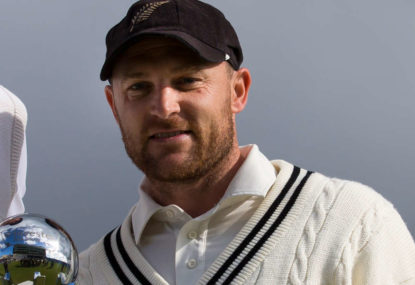The possibiliy of Jofra Archer's career coming to an early end will rob cricket of a bowler with so much talent
While a premature retirement isn’t the solution, he or England want, he may be forced into it if he can’t maintain a long run of matches.

If you haven’t had the chance to read or watch Brendon McCullum’s MCC Spirit of Cricket lecture, do it.
It’s a fascinating insight into the mind of a champion, chronicling his falling in love with the game as a young boy, to gradually losing that passion with the rise to elite status, to eventually rekindling the flame in the face of tragedy.
In a sporting world increasingly ruled by statistics and analysis, science and technology, KPIs and performance models, and, above all, money, the former New Zealand skipper’s speech is a much-needed reminder that sport, after all, is only a game.
Far from rendering it meaningless though, being ‘only a game’ is what makes sport so meaningful for so many people. The ultimate escape from the banality of everyday life, it’s an avenue to experience all the emotions that a seemingly cyclical, meaningless, 9-to-5 existence can quell.
It provides moments of inspiration when all else seems worthless, feats that leave you questioning the boundaries of human achievement, and, dare I say it, even a spiritual connection to the teams and athletes that colour our imaginations in times when all else looks grey.
The reason sport has such an effect is its inherently subjective, qualitative nature – a far cry from the objective, quantitative functioning of a business. The lines are blurring between these two worlds though, with the raw, unbridled and unpredictable nature of sport being gradually eroded by the application of business-like structures, accountability, performance reviews and the wholly quantitative understanding and pursuit of success (i.e. pursuit of money).
What this model fails to account for is that sport is played by humans, not robots. You may be able to apply computerised, data-driven models of success to technologically-driven machines, but not to humans. It is the most powerful of all machines that determines outcomes more than anything – the brain. Be it the clarity of mind of someone like Usman Khawaja, or the fearless bravado of McCullum, it’s inside the heads of athletes, not boardrooms, where success is determined.
For McCullum and his side, it was a change of attitude, not of tactics or preparation, which resulted in a change of fortunes. After an embarrassing 45 all out at the hands of South Africa in his first Test as captain, he explains how an impromptu talk with the coaching staff concluded that team lacked soul, and had forgotten what it really meant to play the game.
“We didn’t ‘white-board it’, we just spoke from the heart,” he says. “We wanted to remove a lot of the analysis…we reduced the various theories that had dominated so much of what we did; we planned less, had fewer team meetings and we tried to be the very best we could be.”
From that point onwards they focused less on the quantitative and more on the qualitative, they set out to be a team that would be respected by opposition and fans alike, to not fear failure and to enjoy their cricket above all else.
It took an unprecedented emotional situation though for the side to truly free themselves from the performance-driven demands of modern sport, and to just play. It was November 2014, and day two of New Zealand’s Test against Pakistan was postponed as the tragic news surfaced before play that Phil Hughes had passed away.
Despite the players’ objections, the game went ahead the next day, and many of them walked onto the field in tears, no-one wanting to be there. It was the wise words of sports psychologist Gilbert Enoka to the captain the night before which cemented the ‘no-consequence’ attitude epitomised by freedom that would spark the Black Caps to their highest ever Test total of 690 – an innings victory, and subsequent performances that all the planning and analysis in the world had failed to produce.
Enoka told him to “throw out the window” all the preparation, planning, and everything he had previously thought about cricket and about winning, which McCullum describes as a “revelation” and a “release of many of the external factors that can creep in and influence a player.”
On these external factors he quotes former Middlesex captain Ed Smith, who articulates it perfectly in saying, “if every sportsman simply tried to be the best he could be, and attempted to behave decently along the way, you’ve pretty much summed up every available optimal strategy in one simple sentence.”
As sport becomes increasingly commercialised and more hinges on results than ever before, coaches and administrators can be forgiven for looking to the business world for strategies to enhance performance and minimise scrutiny.
But McCullum’s New Zealand side showed what can happen when athletes are treated as humans, with emotions, rather than programmable performance machines. If sport continues on its current trajectory, I fear the consequences of it losing the power of escapism and ability to inspire in its rawness and imperfection. But money talks, and it says results are all that matter.